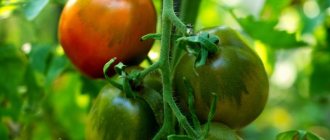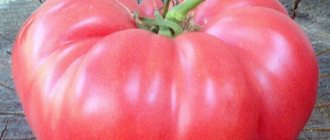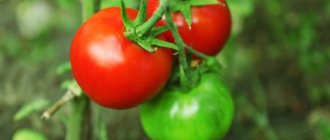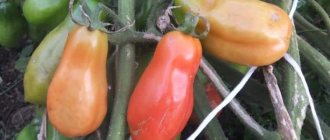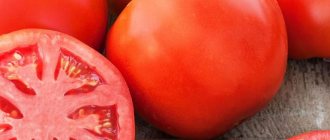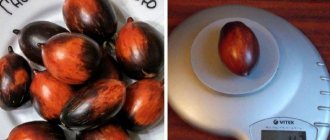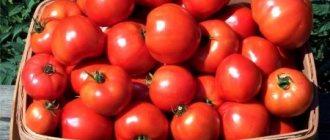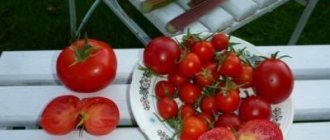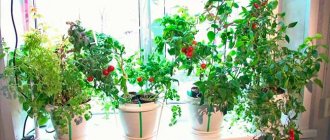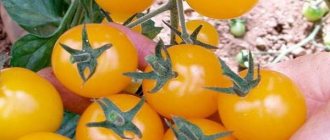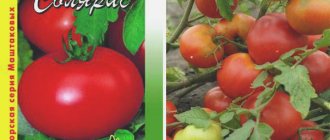Tomato Currency will certainly make its owners richer not only financially, but also in terms of health. Healthy tomatoes have many beneficial properties. In addition, they have high commodity value and demand in the market.
| Height | Landing location | Ripening time | Fruit color | Fruit size | Origin | Fruit shape |
| Medium height | Greenhouse, Open ground | Mid-season | Reds | Average | Variety | Round |
Characteristics of the variety
The Currency tomato is classified as a determinate fruit. For an experienced vegetable grower, this means that it is low or medium-sized and stops its growth without additional pinching, although for the bush to form correctly it needs to be pinched. The bushes of the variety reach a height of no more than 80 cm and require a garter, as large fruits can break it. Forms strong stems of medium thickness, dense foliage that can protect against sunburn.
The variety tolerates temperature changes well, cold, rainy and dry weather, although this undoubtedly affects the amount of harvest. Basically, the Valutny tomato is zoned for southern and central Russia; if planted in a greenhouse, it grows under any external conditions.
How to grow
The State Register states that this variety can be grown both in a greenhouse and in open ground. “Valutny” can adapt to many weather conditions, which sets it apart from many other competitors.
Producing seedlings should begin 60-90 days before planting in the ground.
Despite the fairly thick stems, it is strongly recommended to tie the bush to prevent it from falling. On one bush there can be up to 6 tomatoes on each brush at the same time, which is a very high load and the bush can fall from any gust of wind, which will kill it.
See also
Description of the tomato variety Effect, its characteristics and yieldRead
This tomato has high immunity, but it cannot be said that it is absolutely immune to various diseases. To prevent infection with viral and fungal diseases, it is necessary to carry out a number of preventive procedures even before starting to grow.
It is also necessary to carefully monitor the bushes throughout the ripening process. To guarantee the health of the tomato, the bushes should be treated with various preparations at different stages of growth.
Watering should be moderate to avoid late blight. If this infection, which is a scourge for many varieties of tomatoes, has nevertheless reached your seedlings, then it is necessary to significantly reduce the number of waterings, as well as ensure a maximum flow of fresh air.
The “Valutny” tomato does not require any special fertilizers. If you are just a beginner gardener, you can ask the store clerk about them. It is recommended to use fertilizers high in potassium as well as calcium. Such fertilizers will ensure good growth and protection from all kinds of diseases.
Description of fruits
Tomatoes have a round shape, bright red color, and are quite large, since their average weight is from 100 to 200 g. At the same time, a cluster of 5-6 tomatoes can form on one inflorescence, which additionally indicates the need to tie them up. The fruits are dense, fleshy, juicy. In terms of use in cooking, the variety is universal: suitable for preparing salad, as well as heat-treated dishes, canning, drying, etc. From 1 sq. m of plantation, you can collect 5-6 kg of fruit.
Variety value
The value of tomatoes lies, first of all, in their resistance to unfavorable natural conditions, which make it possible to grow vegetables in any corner of our country. This is especially important when cultivating tomatoes on an industrial scale.
"Pros and cons"
The main advantages of the Currency tomato are the following features:
- resistant to adverse conditions and diseases;
- fruits are resistant to cracking;
- tomatoes have a beautiful presentation;
- productive variety;
- average ripening time;
- culinary versatility.
It is difficult to name any negative aspects; we can say that there are none. At the same time, the difficulties of his agricultural technology include the necessity of tying to a support and the need for stepsons.
Description of the tomato variety Valutny, reviews, photos
Mid-season, high-yielding, determinate tomato variety for open ground and film shelters from Siberian breeders.
The plant is standard, 0.7-1 meters high, requires partial pinching. A garter to a support is desirable. The leaf is medium sized, dark green, regular, tomato-type. The inflorescence is simple.
Fruit characteristics
The fruits are round, dense, smooth, red in color at maturity, weighing 120-200 grams, fleshy, good taste. Not prone to cracking. These tomatoes are suitable for both fresh consumption and canning, making juices and sauces.
The variety is transportable. Tolerant to unfavorable growing conditions.
Planting pattern : 50 x 40 cm.
The Valutny tomato is included in the State Register of the Russian Federation for cultivation in open ground and under film covers.
Originator : Dederko V.N., Postnikova O.V.
If you grew tomatoes of the Valutny variety, please write whether you liked them or not. What was the yield and taste of the fruits in your climatic conditions? If possible, attach a photo of these tomatoes.
Your reviews of the Valutny tomato and additions to the description will help many gardeners evaluate this variety more objectively and decide whether it is worth planting or not.
Maybe you can recommend some more productive varieties?
Popular tomatoes this year
The Currency tomato is very beautiful to look at and has a high yield. It belongs to determinant varieties. Many people do not attach importance to this term, although the manufacturer always indicates it on the packaging. In fact, there are determinate and indeterminate varieties of tomatoes. In the first case, the term indicates limited growth of the plant, and in the second, unlimited growth. Next, the characteristics and description of the variety will be presented.
Preparing the soil mixture
Tomato seedlings Valutny prefers nutritious, soft and loose soil. Ready-made tomato substrates are suitable for growing it, but you can save money and mix them yourself.
To do this, combine turf soil, peat, river silt and ordinary soil in equal proportions. The mixture is fertilized with mineral fertilizers in the amount of 100 g of superphosphate and 20-30 g of potash fertilizers. Some argue that humus should be added here. However, there is an opinion that humus is not suitable for preparing seedling mixture, since it heats up, and elevated temperatures inhibit seed germination.
Important! The prepared soil mixture must be disinfected by calcining it in the oven at a temperature of no more than 100 ºС.
Planting and care
Sowing of seeds is carried out in early - mid-March.
Preparing the soil mixture
The soil mixture is prepared from a turf substrate; peat and sand are added for looseness. Add compost as fertilizer.
Fresh humus cannot be used. Under its influence, the soil heats up and the seeds spoil.
Mineral salts include:
- superphosphate 100 g;
- potassium complex 20 g.
The finished soil is disinfected with 1% potassium permanganate or by calcination in the oven.
Seed calibration and treatment
First of all, tomato seeds are calibrated by selecting obviously spoiled grains. Immersing the seeds in a 5% solution of table salt will help select empty grains, which after 5-7 minutes will remain on the surface, while high-quality seed material will settle to the bottom.
Seeds are treated with fungicides. For these purposes, you can use the same fungicides that were indicated above for treating containers for seedlings - all of them are suitable for tomatoes. Solutions are prepared in the proportions specified in the instructions for a particular drug. At the same time, the fungicide is diluted in warm water and the seeds are immersed in the resulting solution for about 20 minutes. After processing, the seed is dried.
In addition, tomato seeds are treated with stimulants to accelerate growth and germination. Such drugs as Biostim, Radifarm, Kornevin, Epin are suitable for this purpose. Solutions are also prepared strictly according to the instructions of the preparations, after which the seeds are soaked in them for up to 6 hours, placing them in a gauze pocket.
Important! After treatment with growth stimulants, the seeds are not washed, but only dried to a free-flowing state.
Sowing seeds for seedlings and rules for caring for them
Seeds for seedlings are planted at the end of February or in the first half of March. The prepared soil mixture is placed in containers, watered with warm water and the seeds are planted to a depth of 1 cm. The seeds germinate at temperatures from +20ºС to +25ºС, therefore, to create a greenhouse effect, the containers are covered with film. The pots should remain under the film no longer than until germination, after which it is removed.
Picking of Valutny tomato seedlings is carried out after the appearance of the first two true leaves. The seedlings are divided into different pots, slightly deepened to the level of the cotyledons. When caring for seedlings, it is important to monitor the soil moisture, which should not dry out.
Planting seeds
For growing the variety, soft, humus-rich and loosened soils are preferred . The substrate for growing seedlings can be purchased at a flower shop or made yourself. To do this you need:
- mix peat, top layer of turf, regular soil and silt from the river;
- then add phosphorus and potassium fertilizers.
Before planting the seeds, this mixture is calcined over low heat for disinfection. Containers for seedlings, especially those used for more than a year, also need to be disinfected with soapy water and fungicides.
After opening the bag of seeds, you need to sort them, weeding out all the spoiled ones.
To do this, they are immersed for 5 minutes in a weak salt solution, in which all the light, non-germinating seeds will float to the surface, and those ready for germination will settle to the bottom.
Selected seeds are immersed in a solution of fungicides diluted with warm water for at least half an hour and then dried. For details of treatment with each specific fungicide, please refer to the instructions. If desired, you can treat them with growth stimulants (Epin, Radifarm, Kornevin), wrapped in gauze and placed in a solution for 6 hours.
Seeds are planted in seedling containers from late February to early March.:
- The containers are filled with purchased soil or a prepared mixture.
- Water with warm water.
- Make depressions in the soil no larger than 1 cm with your finger and drop a seed into each of them.
- For high germination of seeds, temperatures within 20-25 ºС are required, therefore, if necessary, they are covered with plastic film to create a mini-greenhouse.
After green shoots appear, the film is removed. After the first two leaves appear, the seedlings are picked. Each sprout is planted in a separate pot, trying not to damage the fragile roots.
During the growth of seedlings, the substrate must remain moist. Make sure that excess moisture does not accumulate in the container, which can cause rotting of the roots.
Planting seedlings in open ground
After spring frosts have passed irrevocably, tomato seedlings are planted in the ground. Previously, the site is weeded and loosened for future beds, and straw or sawdust is prepared for mulching.
To avoid damaging the root system of the seedlings, they are shed with warm water before removing them from the pot. Holes for seedlings are made according to a 40x60 cm pattern. Ideally, a glass of humus will be added to the hole as an organic fertilizer. The holes are watered with warm water, seedlings are buried in them and buried. At the end of planting, the beds should be mulched with straw or sawdust, distributing them over the ground in an even layer.
Planting and care
Sowing of seeds is carried out in early - mid-March.
Preparing the soil mixture
The soil mixture is prepared from a turf substrate; peat and sand are added for looseness. Add compost as fertilizer.
Fresh humus cannot be used. Under its influence, the soil heats up and the seeds spoil.
Mineral salts include:
- superphosphate 100 g;
- potassium complex 20 g.
The finished soil is disinfected with 1% potassium permanganate or by calcination in the oven.
Bush care
Watering of Valyutny tomatoes is carried out at least once a week, pouring water at the root. A drip irrigation system copes well with this task, which optimally saturates the soil with water, without creating an excess of moisture and leaching of useful substances, which can occur when watering with sprinklers, not to mention watering with a direct stream from a hose.
Important! Water should not get on the bushes themselves, otherwise this can lead to plant disease.
Tomatoes love phosphorus and potassium, so during the growth of the bushes they should be fed at least 2 times with solutions of superphosphates and ammonium nitrate, adding them in small quantities to the root. The solution is prepared at the rate of 1 tbsp. spoon of mineral fertilizer per 10 liters of water. At the same time, compositions containing chlorine compounds should be avoided.
Growing of Valutny tomato bushes is carried out two weeks after planting the seedlings. Gradually tear off 1-2 leaves, as well as lateral stepsons, leaving 2-3 stems for development. With the help of pinching, resources are released for the growth and ripening of fruits. Weeding of bushes is carried out as necessary, depending on the contamination of the soil.
Resistance to diseases and pests
As already mentioned, the Valutny variety is extremely resistant to diseases, especially late blight, septoria, anthracnose, gray and white rot. At the same time, the prevention of diseases is the correct agricultural technology, if violated, even such varieties can get sick.
You should not plant tomatoes in areas if nightshades grew on them last year, and especially those that were infected. You should try growing other crops on the site, and repeat planting tomatoes after a year. You should not overwater the bushes or allow them to become clogged, because this leads to rotting of the stems, roots, and the spread of pests. Preventive treatments with fungicides Quadris, Strobi, Ridomil and others are also important. Treatment is carried out according to the instructions for the specific fungicide.
Pests for tomatoes are whitefly, spider mites, Colorado potato beetles and others. No variety can provide resistance against them, so it is necessary to carry out preventive treatments with insecticides - Konfidor, Tanrek, Borey and others.
Thus, the Valutny tomato is a robust variety that will become a lifesaver in regions with harsh climates. At the same time, it will ensure sufficient yield and quality of the resulting fruits.
